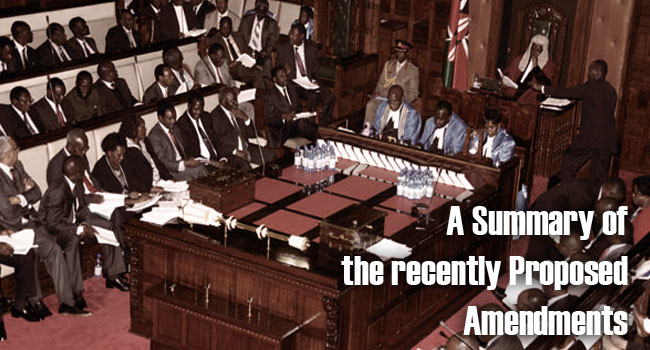A Summary of the Recently Proposed Amendments

By Melissa Lukulu
In the wake of the ongoing amendments that have evoked mixed reactions from Kenyans, it is a noble consideration to uphold the spirit of the Constitution which establishes certain strict checks and balances and enshrines public participation in the legislative process.
The Parliament passed the Statute Law (Miscellaneous Amendments) Bill, 2012 published in Kenya Gazette Supplement No. 34 (Bills No. 17). This Act of Parliament purports to make minor amendments to statute law, as and when necessary for the proper functioning of various creatures of statute.
AMENDMENTS TO THE ELECTIONS ACT, 2011
- The proposed amendment was in respect to section 22 (1) of the Elections Act, 2011 which purported to lower the qualifications for nomination of candidates from the requirement of a degree (post secondary school qualification ) to the minimum of a secondary school education. This move has since been met with an uproar emancipated from the public, decrying the whimsical amendment. Consequently, the requirement of a parliamentary degree to hold position in the National Assembly and the Senate has been recalled. Presently, amongst the requirements in the other arms of government which include the Judiciary, Executive and Public Service is a degree. If the degree requirement stands, 80 of the current MPs will be ineligible to defend their parliamentary seats in the 2013 general elections. The spirit behind the minimum education conditions was efforts to ensure that those entrusted with the noble task of legislating had some quantifiable academic requirement s that can assist them understand the basics of law making.
- Another proposed amendment to section 22 of the Election Act 2011 is to allow presidential candidates and their running mates to concurrently vie for other elective seats. If elected, they would then give up the other seats, occasioning by-elections. The proposed amendment stipulates as follows:- "A person who is nominated as a candidate for election as president or deputy president is nevertheless eligible for nomination and may contest as a candidate for any other election seat in the same election". Section 22 of the Act was intended to give flesh to Article 90 of the Constitution that deals with the allocation of party list seats, by enabling the use of party list nomination criteria to benefit the underrepresented and marginalized groups to have representatives in the legislative assemblies.
- The insertion of "name of a candidate" in its proper alphabetical sequence to include a nickname or other unofficial name that a candidate may use alongside his or her official name.
AMENDMENT TO THE POLITICAL PARTIES ACT, 2011
The proposed amendment is aimed at protecting Members of Parliament from being expelled from political parties for supporting other parties until after the next elections. In respect of the proposed amendment, Members of Parliament can defect to other parties other than the one sponsoring them without losing their parliamentary seats. Additionally, MPs may belong to more than one political party. The proposed amendments affect section 41 and 51 of the political parties act, 2011.Prohibiting party hopping was initially intended to act as a safeguard to party discipline and to strengthen political parties.
BENEFICIAL AMENDMENTS
- The amendment on the third Schedule, which deals with National Oaths and Affirmations which can now be commissioned by the Independent Electoral and Boundaries Commission (IEBC) staff . This saves the IEBC about 150 million shillings which they could have paid to commissioners of oaths for commissioning oaths of secrecy.
- The second positive amendment was on section 108 of the Elections Act requiring balanced and fair share of airtime for candidates and political parties during the campaign period. Thus, both publicly funded and private media are to be fair and balanced in their coverage, since airwaves are a public resource and this requirement is limited to the short official campaign period.
- Finally, parliament has also passed an amendment transferring the role of vetting from the Judges and Magistrates vetting Board to the Judicial Service Commission.


